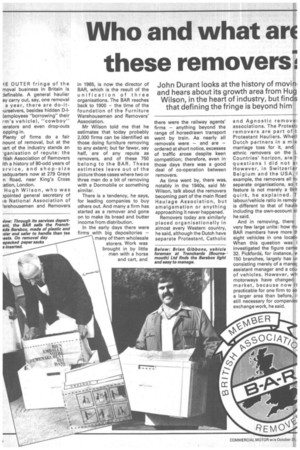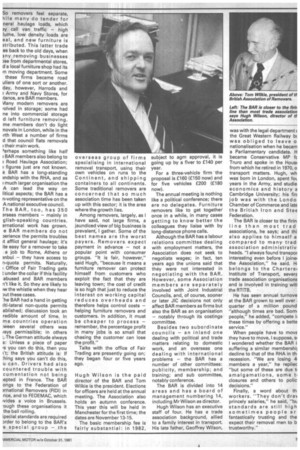Who and what arc these removersi
Page 26

Page 27

If you've noticed an error in this article please click here to report it so we can fix it.
John Durant looks at the history of nnovini and hears about its growth area from Hug Wilson, in the heart of industry, but finds that defining the fringe is beyond him
lE OUTER fringe of the moval business in Britain is iefinable. A general haulier ay carry out, say, one removal a year, there are do-itiurselvers, besides hidden D-I(employees "borrowing" their rm's vehicle), "cowboy" rerators and even drop-outs opping in.
Plenty of firms do a fair nount of removal, but at the :art of the industry stands an -ganisation of repute: the -itish Association of Removers ith a history of 80-odd years of arvice, and shop-size adquarters now at 279 Grays n Road, near King's Cross :ation, London.
Hugh Wilson, who was )pointed general secretary of le National Association of rarehousemen and Removers in 1965, is now the director of BAR, which is the result of the unification of three organisations. The BAR reaches back to 1900 — the time of the foundation of the Furniture Warehousemen and Removers' Association.
Mr Wilson told me that he estimates that today probably 2,000 firms can be identified as those doing furniture removing to any extent; but far fewer, say half, are of any repute as removers, and of these 750 belong to the BAR. These estimates leave out of the picture those cases where two or three men do a bit of removing with a Dormobile or something similar.
There is a tendency, he says, for leading companies to buy others out. And many a firm has started as a remover and gone on to make its bread and butter income from distribution.
In the early days there were firms with big depositories many of them wholesale starers. Work was brought in by little men with a horse and cart, and there were the railway agents' firms — anything beyond the range of horsedrawn transport went by train. As nearly all removals were — and are — ordered at short notice, excesses of traffic arose despite keen competition; therefore, even in those days there was a good deal of co-operation between removers.
As time went by, there was, notably in the 1940s, said Mr Wilson, talk about the removers becoming part of the main Road Haulage Association, but amalgamation or anything approaching it never happened.
Removers today are similarly placed organisationally in almost every Western country, he said, although the Dutch have separate Protestant, Catholic
and Agnostic removei associations. The Protesti removers are part of t Protestant Hauliers. Whetl Dutch partners in a mix marriage toss for it, and ethnic removers on the L Countries' horizon, are I. questions I did not a:. However, in Switzerlar Belgium and the USA, example, the removers all h separate organisations, so t feature is not merely a Brit quirk, he explained. T labour/vehicle ratio in remov is different to that of haulis including the own-account si he said.
And in removing, there very few large units: how mi BAR members have more tF eight vehicles in one locati( When this question was I investigated the figure came 32. Pickfords, for instance, 16 150 branches, largely has ur consisting merely of a manac assistant manager and a cou of vehicles. However, wh motorways have changed market, because now it practicable for one firm to se a larger area than before, ii still necessary for companies exchange work, he said. So removers feel separate, hile many do tender for neral haulage loads, which
call van traffic — high lume, low density loads are eal, and new furniture is 3tributed. This latter trade es back to the old days, when ony removing businesses 3se from departmental stores, d a local furniture shop had its fn moving department. Some these firms became road uliers of one sort or another. day, however, Harrods and Army and Navy Stores, for ;tance, are BAR members.
Vlany modern removers are ,olved in storage; some had ne into commercial storage d left furniture removing. me members don't do light novels in London, while in the ,rth West a number of firms
d that council flats removals their main work.
'erhaps something like half BAR members also belong to i Road Haulage Association; i figures just are not known.
e BAR has a long-standing indship with the RI-IA, and as much larger organisation the A can lead the way on litical aspects; the BAR has a n-voting representative on the A national executive council. The BAR, too, has 350 arseas members — mainly in glish-speaking countries. ernational work has grown.
e BAR members do not 3erience the permits troubles it afflict general haulage; it's ite easy for a remover to take a job to Rome, Athens or 3nbul — they have access to n-quota permits. Naturally,
Office of Fair Trading gets [under the collar if this facility abused and BAR members n't like it. So they are likely to ,w the whistle when they hear 3ut these cases.
The BAR hada hand in getting ilti-lateral non-quota permits ablished; discussion took an redible amount of time. In me countries operation ween several others was tays permissible; in others :. The German attitude always s: Unless a piece of paper fs you can do this, then you i't; the British attitude is: If :hing says you can't do this, u can. Drivers had also countered trouble with cumentation not being :epted in France. The BAR ongs to the Federation of 3mational Removers (FIDI) in nce, and to FEDEMAC, which 'vides a voice in Brussels. :ough these organisations it the ball rolling.
;pecial standards are required 3rder to belong to the BAR's e special group — the overseas group of firms specialising in international removal transport, using their own vehicles on runs to the Continent, and shipping containers to all continents. Some traditional removers are concerned that so much association time has been taken up with this sector; it is the area where the growth lies.
Among removers, largely, as I have said, not large firms, a jaundiced view of big business is prevalent, I gather. Some of the best names are the worst payers. Removers expect payment in advance — not a popular point with consumer groups. "It is fair, however," said Hugh, "because it means a furniture remover can protect himself from customers who exploit the fact that they are leaving town; the cost of credit is so high that just to reduce the interest on working capital reduces overheads and therefore helps control costs — helping furniture removers and customers. In addition, it must be cheaper to process — remember, the percentage profit in many jobs is so small that chasing the customer can lose the profit."
Talks with the office of Fair Trading are presently going on; they began four or five years ago.
Hugh Wilson is the paid director of the BAR and Tom Wilkie is the president. Elections for officers are held at the annual meeting. The Association also holds an autumn conference. This year this will be held in Manchester for the first time; the dates are November 13-15.
The basic membership fee is fairly substantial: in 1982, subject to agm approval, it is going up by a fiver to £140 per year.
For a three-vehicle firm the proposal is £160 (£150 now) and for five vehicles £200 (£180 now).
The annual meeting is nothing like a political conference; there are no delegates. Furniture removers like to get together once in a while, in many cases getting to know better the colleagues they liaise with by long-distance phone calls. Although the BAR has a labour relations committee dealing with employment matters, the Association does not seek to negotiate wages; in fact, ten years ago the unions said that they were not interested in negotiating with the BAR. However, some Association members are separately involved with Joint Industrial Councils, and, of course, sooner or later JIC decisions not only affect BAR members as firms but also the BAR as an organisation — notably through its costings committee.
Besides two subordinate councils — an inland one dealing with political and trade matters relating to domestic work, and an overseas one dealing with international problems — the BAR has a number of other committees: publicity, membership; and training; and sub committee, notably conference.
The BAR is divided into 14 areas and has a board of management numbering 14, including Mr Wilson as director.
Hugh Wilson has an executive staff of four. He has a trade association background, allied to a family interest in transport. His late father, Geoffrey Wilson, was with the legal department the Great Western Railway bt was obliged to leave o nationalisation when he becam a Parliamentary candidate. H became Conservative MP fc Truro and spoke in the Housi from which he retired in 1970,0 transport matters. Hugh, wh was born in London, spent fat. years in the Army, and studie economics and history a Cambridge University; his fir: job was with the Londo Chamber of Commerce and !eta the British Iron and Stee Federation.
The BAR is closer to the firin line than most trad associations, he says; and thi also applies to himself a compared to many trad association administrativ heads. "I always found transom interesting even before I join& the Association," he said. H, belongs to the Charterei Institute of Transport, severa trade association organisation:9 and is involyed in training witl the RTITB.
He has seen annual turnove at the BAR grown to well over quarter of a million pound "although times are bad. Somi people," he added, "compete ii these times by offering a bette service."
When people have to MOVE they have to move, I suppose, si I wondered whether the BAR i suffering a similar membershil decline to that of the RHA in th, recession. "We are losing 4 members a year," he repliec "but some of these are due tl amalgamations, some ti closures and others to polic decisions."
Finally, a word about th workers. "They don't drab princely salaries," he said, "bu standards are still high sometimes people ar fantastically trusting and the expect their removal men to b trustworthy."










































